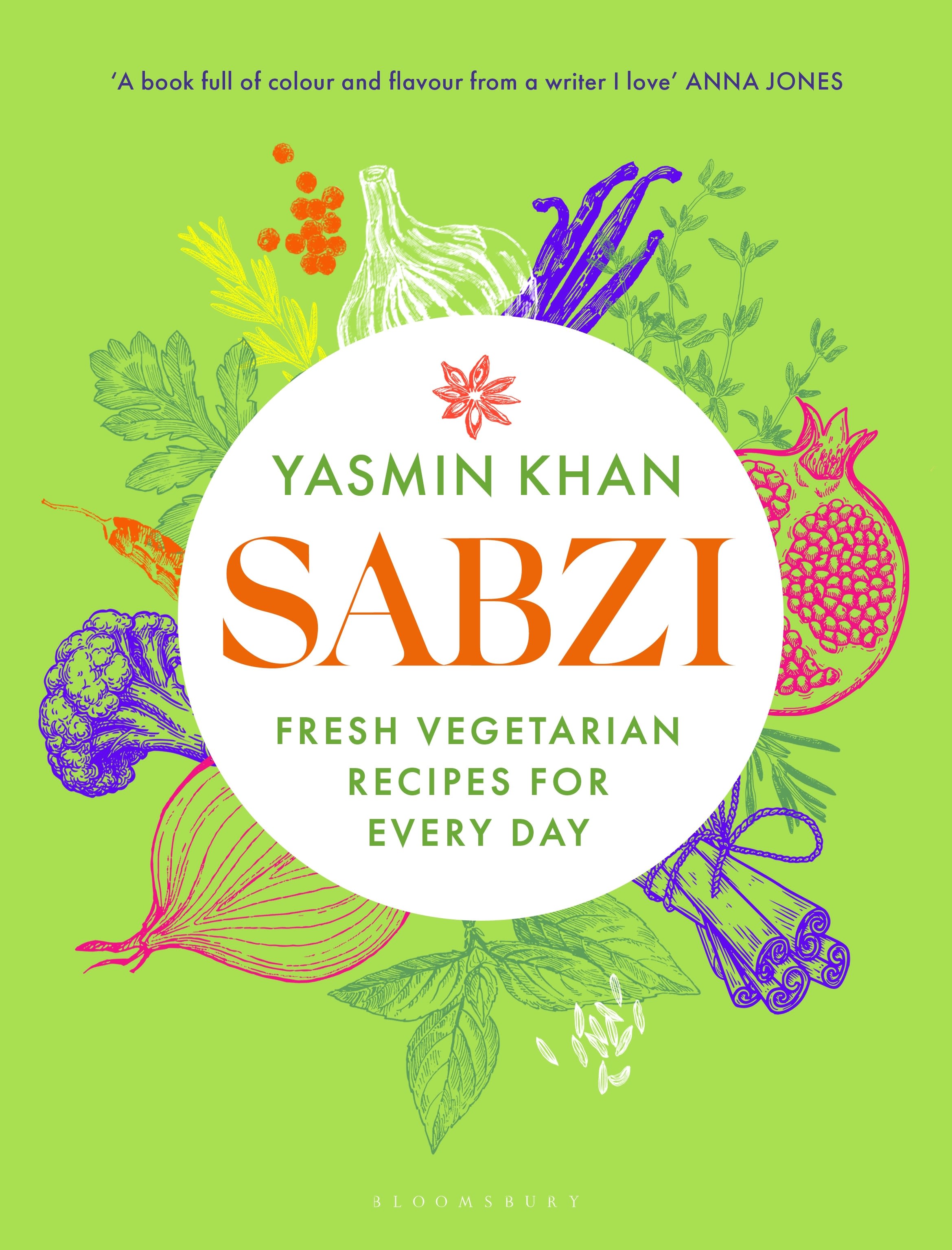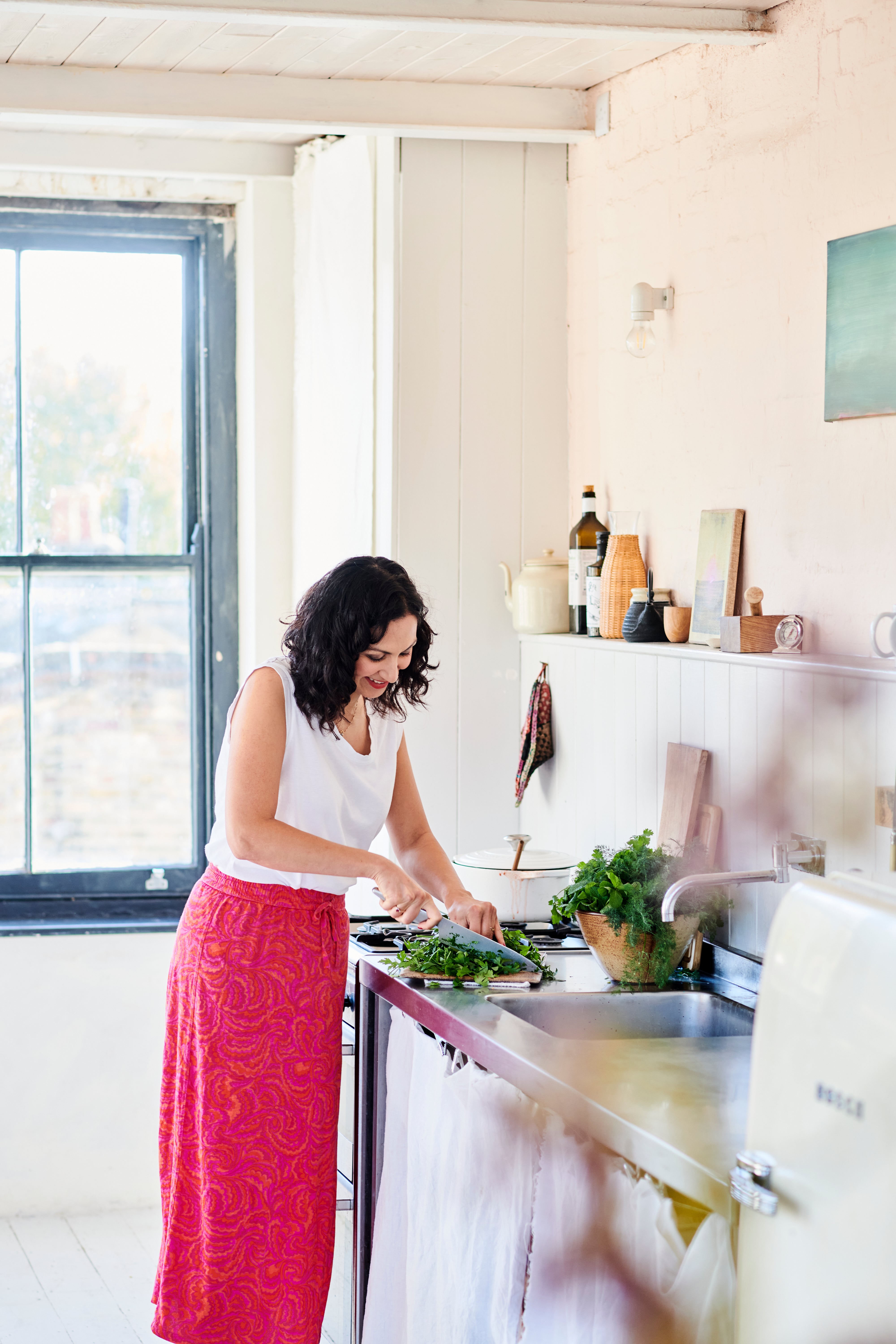
Inspired by her husband’s vegetarianism and the food of her grandparents’ farm, chef and food writer Yasmin Khan wants to bring the Iranian and Pakistani flavours of her mixed heritage into plant-based cooking at home.
“I feel so passionately about sharing the positive, personal connections I have with the Middle East, which is such a beautiful part of the region, but which unfortunately only makes news for the wrong reasons,” says the 44-year-old, after airstrikes by Israel and the US on Iran, in the midst of the war in Gaza. “It’s so heartbreaking.”
Khan’s grandparents were farmers in an agrarian region of northwest Iran. “That’s really where my love of food, food growing and vegetables came from,” she says. “Like anyone who’s been around fresh produce growing up, you just get such reverence from it, because you know how hard people work to grow it.”
But life as a small-scale farmer is hard, she writes in her latest cookbook, Sabzi, and the fraught political situation in Iran in the Eighties, as well as the Iran-Iraq war, “enveloped every aspect” of her family’s day-to-day living.
Predominantly rice farmers, her grandparents also grew “tomatoes, cucumbers, lettuce, herbs, aubergines, potatoes, onions, garlic, butternut squash, pumpkin, and then loads and loads of fruit trees as well. So everything from pomegranate to plums and kiwis,” she notes.
As a result, the cuisine of this area is very bean-heavy and vegetable-focused, she says, and Khan herself eats a predominantly vegetarian diet – 80 per cent to 20 per cent meat and fish.
“My grandmother, she’s such an incredible cook. From her, I learned lots of different classic Persian dishes, but also the techniques that they use, such as making yoghurt from scratch, which is what she used to do, or pickling vegetables, such as pickled garlic, or making sour pickles.

“I had a real mix of food influences growing up, and I was a very hungry child, and so devoured them all.”
While her parents both cooked at home, too. “My dad [who is Pakistani] would be the one making dals or chicken curries. My mum would be making kind of fragrant stews.”
“One of the main roles of food in Persian culture isn’t the ‘sustenance’,” though, Khan says, “it’s the connection”.
She says: “It’s actually about the time that you spend sitting down to eat, which was almost something that was non-negotiable as I was growing up, no matter what happened or how you felt or if you were hungry or if you weren’t.
“My main memory is actually the fondest memories I have with my family in Iran, we would sit on a long, patterned tablecloth that you put on the floor. And everyone sits cross-legged on the floor. It’s very much family-style sharing.”
Meeting her husband and adapting how she ate at home opened her eyes to how to make “flavourful, tasty, plant-based food” and now she’s showcasing “how you can use all those fantastic flavours that we used to in the Middle East – the saffron, the pomegranate molasses, the herbs, the dried limes – in a plant-based diet”.
The recipes in the book – “We’ve got Persian dishes, broader Middle Eastern dishes, and some South Asian dishes that are inspired by my Pakistani heritage” – include aubergine and barberry kuku (one of the bedrocks of Iranian cuisine, she notes) and one of her dad’s specialities, rajma – Punjabi-spiced red kidney beans. But mainly it’s all about adding key flavours to veg you already know: think sweet potatoes with pistachio and mint pesto, and butternut squash and harissa dip.

“I really want to encourage people to get just familiar with some of these key ingredients, whether it’s tahini or pomegranate molasses or sumac, so that they can then riff off them because I think that’s the reality of how we cook at home.”
Pomegranate molasses goes really well with aubergines, she says, such as aubergines with pomegranate and feta. “It also goes really well with tomatoes. I really recommend just putting a spoon of pomegranate molasses in a salad dressing, alongside lemon and a bit of vinegar – it gives this lovely, slight sweetness to a salad dressing.”
While sumac works well in a pilaf. “Maybe if I’ve got some bulgar wheat or brown rice and I throw some roasted veg in there – sumac is a lovely addition to something like that because it’s got these citrus notes and brings a lovely tang with fresh herbs and some pulses. That’s how I think it works really well.”
So if you want to get more veg into your diet, where’s the best place to start?
“I’m a big fan of batch cooking. What I recommend is, I batch cook loads of roasted veg – everything from butternut squash and red peppers to aubergines and courgettes, and then you just have them in your fridge and in the week, you’ve already got your veg prepped, so you can add that to whatever you’re making, like a pasta dish. Or maybe you’re making a salad – just add some of that roasted veg in there.
“You can make a quick soup by pureeing it with some stock, add some lentils and cook it for a bit – for a bit more protein.”
We don’t often see vegetables as the star on our plates. “I think that embracing Middle Eastern or South Asian food is the way forward,” says Khan, who creates “hearty, filling dishes”, not plates that look like they belong on the side.
Persian stews are packed with red kidney beans, loads of herbs and oyster mushrooms – as well as ground walnuts and pomegranate molasses, “so it’s really rich, it’s perfect for a special occasion.”
Becoming a mum in the last year has changed how she thinks about food and cooking.
“I think just becoming a parent has made me even more aware of some of the kind of unregulated aspects of the food industry. I think there still is quite a lot of room for government reform on things like labelling specialist food that’s given to children.”
But mainly, it’s brought her back to the Iranian customs of food as connection. “Before I had kids, I had quite a busy life. I obviously cooked a lot for work, but sometimes, for myself, I wouldn’t really put in that effort.
“Now I find that I’m actually sitting down with my daughter and having our meal together in the evening – it’s one of my favourite times of the day. It’s really creative to think about the things she’s going to enjoy, and it’s lovely to see her facial expressions when she’s trying something new.
“It’s this moment to sit down with her and be really present. And I think that’s the power of food, really.”
‘Sabzi: Fresh Vegetarian Recipes For Every Day’ by Yasmin Khan (Bloomsbury Publishing, £26).
Fast, fuss-free summer recipes for lunches, picnics and eating al fresco
Onions or no onions? This smoky Spanish tortilla ends the debate deliciously
How to make José Pizarro’s Spanish baked rice with pork ribs
Where has all the brie gone? Why Brexit could be to blame for the cheese crisis
Wellness smoothies have collagen, creatine and matcha in them – but do they work?
‘Anyone can cook Spanish food’ – José Pizarro’s secrets for mastering the cuisine







